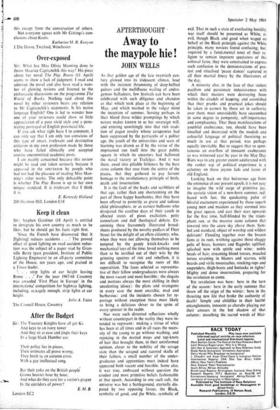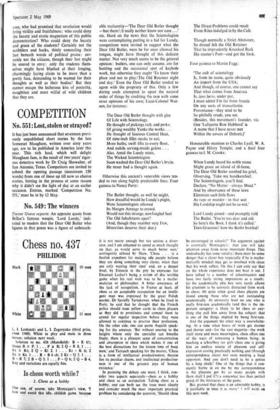Away to the maypole hie !
AFTERTHOUGHT JOHN WELLS
As that golden age of the late twentieth cen- tury glowed into its iridescent climax, loud with the insistent thrumming of deep-bellied guitars and the mellifluous wailing of andro- gynous balladeers, few festivals can have been celebrated with such diligence and abandon as that which took place at the beginning of May, and which marked in the vulgar mind the inception of summer. Sensing perhaps in their blood those wilder promptings by which nature makes known to us her sovereign will, and entering unwittingly into that rich tradi- tion of pagan revelry whose ceremonies had been suppressed by the patriarchs of a politer age, the youth of the universities and seats of learning was drawn as if by the virtue of the imprisoned sun itself into the great public square in which its ancestors had hallowed the naval victory at Trafalgar. And it was there, awed into pitiable littleness by the bare stone column that rose from the centre of the piazza, that they gathered to pay fervent homage to the revolutionary principle of birth, death and insurrection.
It is the fault of the hacks and scribblers of that age, rather than any shortcoming on the part of those happy bacchantes, that they have been offered to posterity as graVe and tedious child philosophers, or as earnest buffoons who dissipated the carefree days of their youth in affected states of pious exaltation, petty iconoclasm and dull- theological debate. Ex- amining these fearsomely illustrated broad- sheets produced by the novelty-pedlars of Fleet Street for the delight of an effete citizenry, who, when they were not allowing themselves to be tempted by the gaudy knick-knacks and mechanical toys of the time, loved nothing more than to be terrified out of their wits by the grinning spectres of riot and rebellion, it is not difficult to recognise the roots of this superstition. The faces selected as representa- tive of their fellow undergraduates were always the most vacant and most horrible : the slogans and mottoes always the most chilling in their unrelenting idiocy : the plans and strategems in every case the most anarchic, mad and barbarous : and the incidents chosen for re- portage without exception those most likely to bring a delicious shiver to the spine of every spinster in the realm.
Nor were such distorted reflections wholly without counterpart in the reality they were in- tended to represent: making a virtue of what has been at all times and in all races the neces- sity of the young to go without washing, and rejoicing in the matted mops and top-knots of hair that brought them, in their uninformed opinion, closer to the nobility of the savage state than the scraped and razored skulls of their fathers, a small number of the under- graduates and apprentices must indeed have appeared both vacant and horrible. Some also, it was true, embraced without question the crudest and most primitive beliefs fashionable at that epoch. According to one such cult, the universe was but a battleground, eternally xlis- puled by two opposing forces, the Black, symbolic of good, and the White, symbolic of evil. That in such a state of everlasting hostility war itself should be presented as White, or evil, though Black and good when waged on behalf of the Black principle against the White principle, many novices found confusing; but, required by a fundamental tenet of their re- ligion to remain impotent spectators of this colossal farce, they were constrained to express such confusion in the demonstrations of pro- test and ritualised 'peace dances' captured in all their martial finery by the illustrators of the day.
A minority also, in the face of that violent pacifism and passionate indecisiveness with which their masters were destroying from within the citadels of leafing, and astonished that their pranks and practical jokes should be taken in earnest by those set in authority over them, must unavoidably have succumbed in some degree to pomposity, self-importance and complacency. That these manifestations of youthful exuberance, too, should have been tinselled and decorated with the modish and colourful language of political theorising so much in use at that period, was perhaps equally inevitable. But to suggest that so spon- taneous an overflow of innocent exuberance as was witnessed year by year in the May Day Riots was to any greater extent adulterated with the ranker sap of political experience is a calumny on those joyous lads and lasses of old England.'
Looking back on that boisterous age from the eminence of our present epoch,.it is not easy to imagine the wild surge of primitive joy, the ecstatic vision of a new-born summer, red- hazed with lust, the quickening pulse of blissful excitement experienced by those superb young men and maidens as they stormed into the great square, and cast their eyes upwards for the first time, half-blinded by the triunt- phant sun, at the massive stone column that towered into the azure sky above them. Sym- bol and standard, object of worship and wildest delirium! Flooding together over the brazen lions at its root, writhing against those shaggy pelts of brass, banners and flagpoles uplifted, splashed now with spittle and wine : noble heads of hair, streaming blond tresses, muscled torsos straining in blazers and scarves, wild beards and virile moustaches, stocking-tops and suspenders, thigh-boots and buttocks in tights! Mighty and dense insurrection, preparing for the revolution to come.
Yet revolution was here: here in the turn of the season: here in the early summer that threw off the reign of the winter: here in the thrusting new life that broke the authority of death! Simple and childlike in their lustful entanglements, innocent as cherubs playing out their amours in the hot shadow of that column : mouthing the sacred words of Mar- cuse, who had promised that revolution would bring virility and fruitfulness: who could deny the beauty and erotic magnetism of this public demonstration? Who could deny the beauty and grace of the students? Certainly not the scribblers and hacks, thinly concealing their lust beneath words of political praise: cer- tainly not the citizens, though their lust might be soured to envy: only the students them- selves might have blushed at their longing, charmingly laying claim to be more than a pretty face, demanding to be wanted for their thoughts as well as their bodies! But they cannot escape the lecherous kiss of posterity, naughtiest and most wilful of wild children that they are.



































 Previous page
Previous page